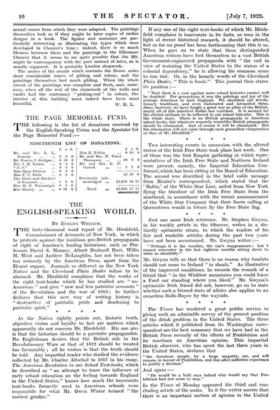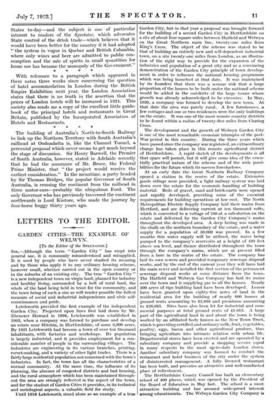THE
ENGLISH-SPEAKING WORLD.
BY EVELYN WRENCH.
As the Nation rightly points out, historic truth, objective vision and loyalty to fact are matters which apparently do not concern Mr. Hirshfield. His one aim is that the historian should be a patriotic propagandist. No Englishman desires that the British side in the Revolutionary Wars or that of 1812 should be treated too favourably ; all he wishes is that the truth should be told. Any impartial reader who studied the evidence collected by Mr. Charles Altschul in 1917 in his essay, The American Revolution in our School Text-books, which he described as "an attempt to trace the influence of early school education on the feeling towards England in the United States," knows how much the inaccurate text-books formerly used in American schools were responsible for what Mr. Owen Wister termed "the ancient grudge." If any one of the eight text-books of which Mr. Hirsh. field complains is inaccurate in its facts, as seen in the light of recent historical research, it should be altered, but so far no proof has been forthcoming that this is so. When he goes on to state that these distinguished American writers have lent themselves to a vast British Government-engineered propaganda with "the end in view of restoring the United States to the status of a colonial dependency," he is allowing his common sense to run riot. Or, in the homely words of the Cleveland Plain Dealer, "This is bunk." This journal thus states its position :— " That there is a case against some school histories cannot well be doubted. For generations it was the privilege and joy of the average American to hate England. We cherished our revolu- tionary traditions, and even elaborated and intensified them. Since, however, we have fought a great war as allies of the British, nearly all of this inherited dislike has vanished. It is natural for the altered attitude to be reflected in our school histories. This is the whole story. There is no British propaganda in American school books, but whatever remotely resembles British propaganda should be eliminated. And of course it will be eliminated. But the elimination will not come through such groundless vituperation as that of Mr. Hirshfield."
Two interesting events in connexion with the altered status of the Irish Free State took place last week. One of these was the first Empire gathering at which repre- sentatives of the Irish Free State and Northern Ireland were present, namely, the Imperial Education Con- ference, which has been sitting at the Board of' Education. The second was described in the brief cable message from Reuter's correspondent, which stated that the 'Baltic,' of the White Star Line, sailed from New York flying the tricolour of the Irish Free State from the masthead, in accordance with the recent announcement of the White Star Company that their liners calling at Queenstown would in future fly the Free State flag.
Just one more Irish reference. Mr. Stephen Gwynn, in his weekly article in the Observer, writes in a dis- tinctly optimistic strain, to which the readers of his fair and readable articles during the past two years have not been accustomed. Mr. Gwynn writes :— " Perhaps it is the weather, the sun's reappearance : but cannot remember in the last eighteen months sitting down to write so cheerfully."
Mr. Gwynn tells us that there is no reason why tourists should not come to Ireland "in shoals." As illustrative of the improved conditions, he records the remark of a friend that "in the Wicklow mountains you could leave a Ford car standing where you liked." Mr. Gwynn's optimistic Irish friend did not, however, go on to state whether such a blessed state of affairs also applies to an ownerless Rolls-Royce by the wayside.
The Times has rendered a great public service in giving such an admirable survey of the present position of the drink problem in the United States. The three articles which it published from its Washington corre- spondent are the best summary that we have had in the British Press recently of the effects of Prohibition and its reactions on American opinion. This impartial British observer, who has spent the last three years in the United States, declares that
"the American people, by a large majority, are, and will remain, in favour of Prohibition, and this after sufficient experience to justify a decision."
And again :— " He would be a bold man indeed who would say that Pro- hibition had not come to stay."
In the Times of Monday appeared the third and con- cluding article of the series. In it the writer asserts that there is an important section of opinion in the United States to-day—and the subject is one of particular interest to readers of the Spectator, which advocates State control of the drink trade—which believes that it would have been better for the country if it had adopted "the system in vogue in Quebec and British Columbia, where only wines and beer are admitted to public con- sumption and the sale of spirits in small quantities for home use has become the monopoly of the Government."
With reference to a paragraph which appeared in these notes three weeks since concerning the question of hotel accommodation in London during the British Empire Exhibition next year, the London Association states that there is no truth in the assertion that the prices of London hotels will be increased in 1921. This society also sends me a copy of the excellent little guide- book of the principal hotels and restaurants in Great Britain, published by the Incorporated Association of Hotels and Restaurants.
The building of Australia's North-to-South Railway to link up the Northern Territory with South Australia's railhead at Oodnadatta is, like the Channel Tunnel, a perennial proposal which never seems to get much beyond the stage of discussion. Sir Henry Barwell, the Premier of South Australia, however, stated in Adelaide recently that he had the assurance of Mr. Bruce, the Federal Prime Minister, that "the project would receive the earliest consideration." In the meantime, a party headed by Sir Thomas Bridges, the popular Governor of South Australia, is crossing the continent from the railhead in three motor-cars--probably the ubiquitous Ford. The only Governor who has previously traversed the continent northwards is Lord Kintore, who made the journey by four-horse buggy thirty years ago.















































 Previous page
Previous page